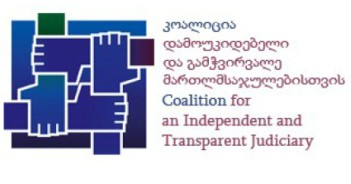The Parliament adopts legislative amendments on Constitutional Court, which threaten democratic development of Georgia
May 17, 2016

Statement, May 14, 2016
The Coalition for an Independent and Transparent Judiciary is deeply concerned by the legislative amendments on Constitutional Court adopted by the Parliament. The Coalition considers that the decision of the Parliament is directed not only against the current members of the Constitutional Court and/or specific judges, but these actions intend to paralyze the work of the Constitutional Court and diminish its important role thereby jeopardizing the fundamental values of modern democratic state such as the rule of law, recognition and protection of human rights, separation of powers and providing adequate, effective and impartial constitutional justice.
The legislative process
It should be noted that the Parliament adopted the mentioned amendments in a rush through a process lacking openness and transparency. The draft amendments were not accessible to the public prior to the Committee hearings. Therefore, this practically prevented discussions on the issues of high public interest.
On May 11, 2016 the rapporteurs of Parliamentary Assembly of the Council of Europe (PACE) published a statement welcoming the stated intention of the Chair of Human Rights Committee of Parliament to submit the draft amendments to the Venice Commission for their opinion to be provided prior to the second plenary session.
However, the Parliament not only ignored the promise but also hastened the adoption of the amendments at the second plenary session and adopted legislative amendments through Committee hearings few hours later (during non-business hours). The changes were adopted in the plenary session next morning.
It is also important to note that the draft law was initiated and adopted in reaction to the Court’s specific judgments oriented toward the protection of human rights though unacceptable for the government. Moreover, prior to the legislative process, there were several administrative offences committed against judges of the Constitutional Court which were not properly addressed and investigated by the state.
The problematic issues of the draft law
The following issues threaten proper functioning of the Court:
• Delivering proper judgements by the Plenum (full bench of the Court) – the Plenum is authorized to render judgments if 7 out of 9 judges are present. Judgments (including the ones on the suspension of norms) are made if they are supported by 2/3 of the full bench. Such a high quorum comes at odds with international standards, including the Venice Commission assessments and is highly probable to paralyze the work of the Court.
• Adequate operation of a Board composed of 4 judges – any judge with a dissenting opinion is authorized to refer a case to the Plenum. Thus, a Board may not be able to deliver judgments in a timely and effective manner.
• Decision making on any specific issues – according to the proposed amendments, any dispute concerning constitutionality of an organic law in relation to human rights, has to be considered by Plenum in accordance with the abovementioned quorum. Such issues include disputes concerning statutes on elections, laws governing the work of the Constitutional Court, suspension of a disputed norm and other important issues, which require delivering effective decisions by the Court. Rights and interests of the parties of the proceedings – after expiration of the term (10 years) a judge automatically leaves the office. Due to this rule cases considered by the previous composition of judges in a main hearing have to be referred back to the preliminary stage of the proceedings. In view of the nature of constitutional justice, this rule will have a considerably damaging effect on parties of the proceedings. It may also increase a caseload in the Court because newly appointed judges will have to consider the already examined cases together with new ones.
In light of the mentioned arguments, we consider that the adopted draft law grossly violates fundamental principles of a democratic state and endanger its democratic development. These changes intend to diminish the Constitutional Court’s authority and by introducing complicated procedures reduce its effectiveness and paralyze it in practice.
News
December 13, 2023
Ethnic minorities outside the peace dialogue
November 6, 2023
‘Peace’ agenda of political parties
Popular
Articles
February 13, 2024



